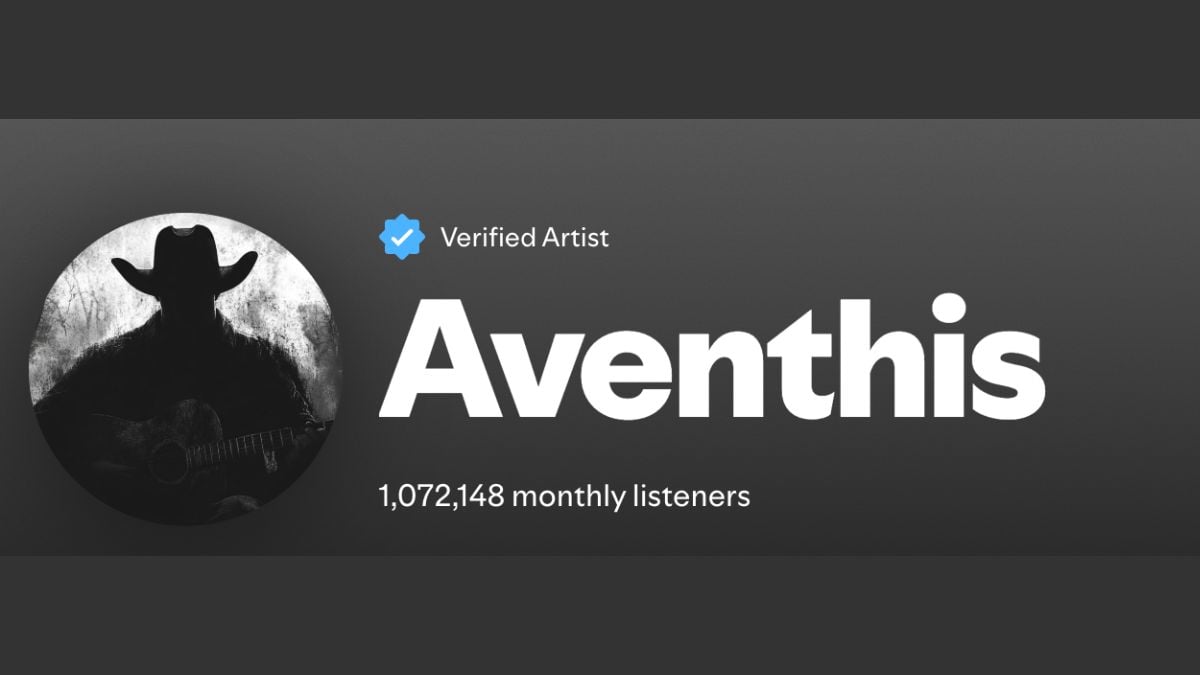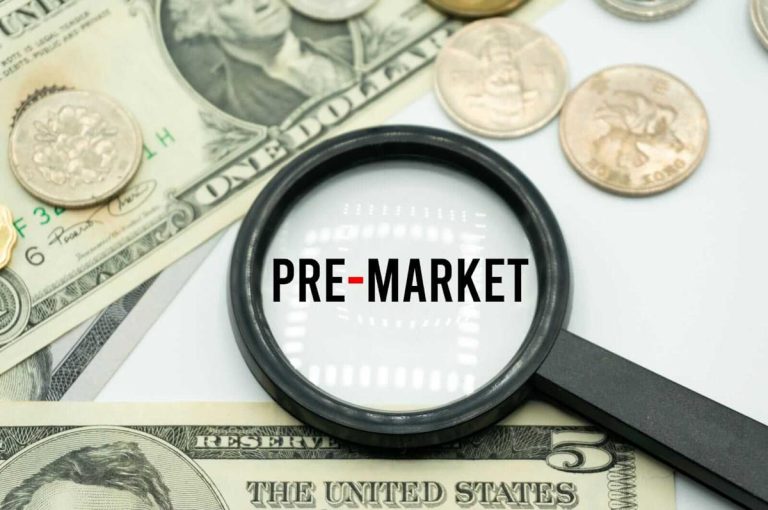At first, everything appears to be in order. But it’s not.
I’ve uncovered multiple examples of how AI-generated music released by – oh yes – fake artists is rapidly growing in popularity on music streaming services.
I’ll focus on Spotify – mainly because of the transparency it offers when it comes to listening data.
Yet music from all of the artists named below is available on a range of streaming services, including Apple Music, Amazon Music, YouTube Music, and more.
Aven-this… cannot be real
Outlaw country artist Aventhis is verified on Spotify – where just over a million (1.072M) listeners absorb his work each month.
He’s even popular enough to have one of those official Spotify-generated ‘THIS IS… Aventhis’ playlists under his name.
And his music? It’s gaining traction, with the blues-soaked, 2025-released Mercy On My Grave racking up more than 2 million plays.
You already know what comes next, but that doesn’t make writing it feel any less depressing.
Aventhis isn’t real. Neither is his voice. He, and it, are both AI-generated.
Aventhis is not an outlaw of any kind. He’s a bot.

I know this for sure because, to verify it, I deployed some sophisticated decoding technologies. Namely: a human being’s eyes, brain, and fingers. Plus the internet.
Three months ago, over on YouTube, under one of Aventhis’ videos, a commentator outright asked what role AI has played in the artist’s music.
The anonymous owner of Aventhis’ channel replied: “[The] voice and image is created with the help of AI. The lyrics are written by me.”
I’d wager that, in this case, ‘me’ is really David Vieira – the man credited as the songwriter and producer behind Aventhis’ songs on Spotify (see below).
I’d also wager that, to create Aventhis’ music, Vieira probably used one of Udio and Suno – the two best-known generative AI music platforms, which both enable users to input their own lyrics for created songs.

Aventhis was recently recommended to me by Spotify via an algorithmic playlist.
So far, ‘he’ has released three albums of songs on Spotify and other streaming services: Dark Country Vol.1, Dark Country Vol.2, and Dark Country Vol.3.
All three have arrived in the past four months – 57 tracks in total.

The Devil’s in the detail
Once I started listening to Aventhis, Spotify soon recommended another AI artist, also in the ‘outlaw country’ field, and likely created with Suno or Udio.
The Devil Inside is a ‘band’ with approximately 700,000 Spotify monthly listeners.
Like Aventhis, they are Spotify ‘verified’ and their biggest track – Bones In The River – has 1.6 million streams to date.
The Devil Inside takes the ‘AI-as-f**k’ trophy here, because the group has an entirely fake persona… and fake faces.
According to their streaming platform biography, the band hails “from the rugged landscapes of the American South”.
Then the insidious bit: “The songs are based on real creative inspiration, but the characters are illustrative. The images are part of a carefully crafted visual world that complements the music’s dark, cinematic atmosphere, much like a graphic novel or a fictional film universe.”
In other words, the guys you see below – who have their own Instagram page and a range of merch available online – have never actually been born.
In the human sense, anyway.


Sundown, you better beware vs. Hustles Culture
Some hulabaloo has been caused in the past few days by a different, seemingly AI-generated band – The Velvet Sundown – gaining traction on streaming platforms.
Following some media pickup, The Velvet Sundown now has just over 550,000 Spotify monthly listeners.
They, too, have an AI-generated band ‘photo’ (see below).
And just like Aventhis and The Devil Inside, they are ‘verified’ on Spotify, with an official ‘THIS IS…’ playlist on the service.

At least some of the online outrage caused by The Velvet Sundown in recent days has been driven by their music being recommended in subscribers’ algorithmic playlists, like Discover Weekly.
In truth, this is nothing new.
Around six months before Spotify recommended me Aventhis’ music, I was directly pitched a suspiciously AI-looking artist by the platform for the first time.
Nick Hustles’ oeuvre combines classic soul sounds of the ’70s with (often pretty offensive) lyrical pastiches of modern street slang.
As we headed into the 2024 festive break, my algo-Spotify playlist added Hustles’ Christmas-themed I Caught Santa Clause [sic] Sniffing Cocaine.
Puerile lyrics and slight AI wobble in the vocals aside, the track was – ahem – heavily influenced by the lazy bass runs and falsetto vocals of Marvin Gaye’s I Want You-era output.
Today, Nick Hustles’ most popular tracks include ‘I Feel Like Slapping A N**** Today’, ‘I LOST MY FUCKING VAPE AGAIN’, and ‘Be Yourself’.
Another Hustles track, ‘Why U N****s Gotta Hate,’ gets a special mention here because 50 Cent recently filmed himself singing along to it – and affectionately chuckling at its lyrics – before broadcasting it to his 35 million Instagram followers.
Nick Hustles currently has over 200,000 monthly listeners on Spotify.
Unlike the other AI artists mentioned here, with Hustles, there is a decent online footprint of who actually created him.
According to social profiles, Nick Hustles was unleashed into the world by Nick Arter, who describes himself as a “Songwriter | Lyricist | AI Storyteller | Music Futurist”.

Apparently based in Pennsylvania, Arter is the founder of social channel AI For The Culture, which has over 100,000 followers on Instagram.
Said Instagram page features an array of fictional AI artists of Arter’s creation, usually presented as having recorded ‘deep cuts’ from long-lost 60s/70s/80s soul and funk records.
This article has yet to discuss how the popularity of AI artists on streaming services – and the rapidity with which ‘they’ can release new tunes – could potentially divert royalties away from real human performers.
“Songwriter | Lyricist | AI Storyteller | Music Futurist.”
Nick Arter’s biog on Instagram
Suffice to say that, since Nick Hustles’ music started appearing on Spotify last year, he (aka: Nick Arter) has released over 50 ‘singles’ on the platform.
Tellingly, one of Arter’s Instagram tracks, attributed to the completely made-up artist Terry “Goldmind” Watkins, is called I Make More Money Than My Teachers.

The bigger picture
Now that we’ve started exploring this rabbit hole, it’s not very hard to find many more AI-generated artists appearing on Spotify, Amazon Music, and YouTube Music.
For example, judging by the telltale factors (algorithmic relation to other AI acts, suspicious artwork, the AI vocal ‘wobble’, etc.), I suspect the following artists have all been created with Suno/Udio/alternatives.
I discovered many of them when they were linked to other AI artists in Spotify’s ‘Fans Also Like…’ section.
As you can see, they’re all doing nicely.
So.
In this article alone, based on a few days of rudimentary research, I’ve named 13 different AI-made ‘artists’ currently active on Spotify, with approximately 4.1 million cumulative monthly listeners between them.
- Obvious question 1: Is this scratching the surface? How much ‘AI slop’ is now running free on music streaming platforms like Spotify – and how much ‘stream-share’ in terms of royalties are being absorbed by the creators of these fake acts?
- Obvious question 2: Is there any hope that music streaming services and DIY distributors will/can clean up this music? Would doing so, behind closed doors at the DSPs, actually clash with a tech utopian ideology?
- Obvious question 3: Where is all this going?
I can take a crack at answering Q3, there. It’s not a happy place.
Under Aventhis’ ‘Fans Also Like…’ section on Spotify (see below), you’ll find the equally AI-born Devil Inside, Aven, and AV8.
You’ll also find very non-AI artists, including Bryan Elijah Smith, whose The Line is one of my favourite songs from the past year (by an actual homo-sapian).

And here’s the thing. You see Sons Of Legion, above?
They’re a real and popular human duo based in Nashville – who’ve signed to Concord.
But earlier, especially considering the Spotify-recommending-AI situation, I couldn’t be sure.
To check, I deployed music’s acid test for humanness: I searched for any upcoming tour dates – to no avail.
Then I scanned their socials, and found, just a few days ago, they both spoke to camera – explaining that although they might do “pop up” shows in 2025, they won’t look to do a proper tour until 2026.
‘How convenient,’ I found myself thinking. ‘So you don’t need to prove to anyone you’re actual human beings. Am I looking at a couple of AI-generated deepfakes here?’
I wasn’t. I wish Sons Of Legion a long and successful career ahead.
Yet this experience reminds us how skeptical music fans might become over authenticity, should fictional AI slop continue to be splattered throughout their streaming services.
Naturally, the ultimate test of whether fans like – or trust – an artist necessitates actually seeing them perform… up close, and away from a screen.
When you think about it, perhaps it was ever thus.Music Business Worldwide







